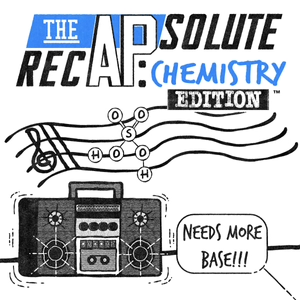
The APsolute RecAP: Chemistry Edition - Episode 61: Unit 7 Selected FRQs
01/24/22 • 12 min
The FRQ questions on the AP exam often combine content from two or three different units. In today’s episode, we are emphasizing questions that require knowledge and skills from Unit 7: Equilibrium. You will rarely find an FRQ that solely focuses on Unit 7, since it lays the foundation for Unit 8, acids and bases as well as parts of Unit 9, Application of Thermodynamics. It also links back to concepts from earlier units, like gas laws. The questions we are using today are online accessible. Our suggestion: Answer the questions yourself and then listen to this episode to hear the explanations, as well as do’s and don'ts for answering questions of Unit 7. We will review 2016 - Question 6, 2015 - Question 4 and 2014 - Question 4. These are released FRQs from previous exams and copyright of the College Board.
Thank you for listening to The APsolute RecAP: Chemistry Edition!
(AP is a registered trademark of the College Board and is not affiliated with The APsolute RecAP. Copyright 2022 - The APsolute RecAP, LLC. All rights reserved.)
Website:
EMAIL:
Follow Us:
The FRQ questions on the AP exam often combine content from two or three different units. In today’s episode, we are emphasizing questions that require knowledge and skills from Unit 7: Equilibrium. You will rarely find an FRQ that solely focuses on Unit 7, since it lays the foundation for Unit 8, acids and bases as well as parts of Unit 9, Application of Thermodynamics. It also links back to concepts from earlier units, like gas laws. The questions we are using today are online accessible. Our suggestion: Answer the questions yourself and then listen to this episode to hear the explanations, as well as do’s and don'ts for answering questions of Unit 7. We will review 2016 - Question 6, 2015 - Question 4 and 2014 - Question 4. These are released FRQs from previous exams and copyright of the College Board.
Thank you for listening to The APsolute RecAP: Chemistry Edition!
(AP is a registered trademark of the College Board and is not affiliated with The APsolute RecAP. Copyright 2022 - The APsolute RecAP, LLC. All rights reserved.)
Website:
EMAIL:
Follow Us:
Previous Episode

The APsolute RecAP: Chemistry Edition - Episode 60: Factors Affecting the Dissolution of a Salt
This episode is an application of earlier discussed concepts. In episode 33 we talked about disruptions affecting equilibrium: concentration, temperature and pressure. In episode 34, solubility equilibria, we talked about the dissolution of a salt. In this episode we set our focus a bit differently: We look at environmental factors, like pH or other dissolved ions and how they affect the dissolution of a salt. pH was a concept introduced in Unit 4 with more in depth coverage in unit 8 It's all connected. So, let’s recap the recaps that lay the foundation for this episode, then introduce the new concepts and dive into how these factors affect the dissolution of a salt.
Thank you for listening to The APsolute RecAP: Chemistry Edition!
(AP is a registered trademark of the College Board and is not affiliated with The APsolute RecAP. Copyright 2021 - The APsolute RecAP, LLC. All rights reserved.)
Website:
EMAIL:
Follow Us:
Next Episode

The APsolute RecAP: Chemistry Edition - Episode 62: Molecular Structure and Acid Strength
All hydrohalic acids, but hydrofluoric acid, are strong acids. Why is that (0:31)? Strong acids fully dissociate and have a large Ka, weak acids only dissociate to a small percentage (1:20). When looking at strength, we are comparing the stability of the conjugate acid/base pair partners (2:00). For binary acids across a period (2:37) as well as down a group (3:09) electronegativity determines acid strength. For oxyacids, we can compare acids with different numbers of oxygen atoms, which affects the inductive effect, as well as resonance structures (4:58). We can also discuss acid strength across a period (6:44) and down a group (7:34). Bases are proton acceptors. Common bases are conjugate bases of weak acids, like carboxylic acids, and amines (7:53).
Question of the Day: Acid A has a Ka = 3.5 x 10-8, acid B has a Ka = 1.2 x 10-2. Which acid is HClO, which one is HClO2?
Thank you for listening to The APsolute RecAP: Chemistry Edition!
(AP is a registered trademark of the College Board and is not affiliated with The APsolute RecAP. Copyright 2022 - The APsolute RecAP, LLC. All rights reserved.)
Website:
EMAIL:
Follow Us:
If you like this episode you’ll love
Episode Comments
Generate a badge
Get a badge for your website that links back to this episode
<a href="https://goodpods.com/podcasts/the-apsolute-recap-chemistry-edition-450043/the-apsolute-recap-chemistry-edition-episode-61-unit-7-selected-frqs-61354404"> <img src="https://storage.googleapis.com/goodpods-images-bucket/badges/generic-badge-1.svg" alt="listen to the apsolute recap: chemistry edition - episode 61: unit 7 selected frqs on goodpods" style="width: 225px" /> </a>
Copy




